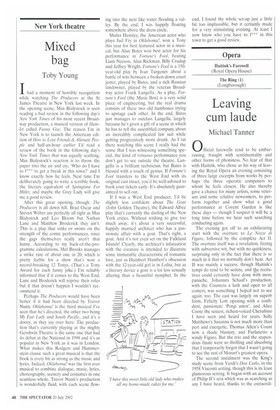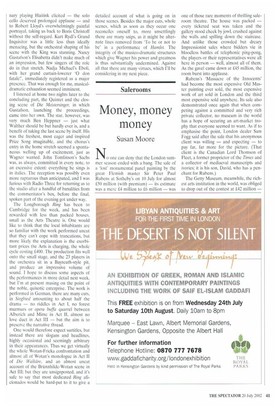Haitink's Farewell (Royal Opera House) The Ring (I) (Longborough)
Leaving cum laude
Michael Tanner
Official farewells tend to be embarrassing, fraught with sentimentality and other forms of phoniness. No fear of that with Haitink, who chose as his way of leaving the Royal Opera an evening consisting of three large excerpts from works by perhaps the three operatic composers to whom he feels closest. He also thereby gave a chance for many artists, some veterans and some relative newcomers, to perform together and show what a good performance at Covent Garden is like these days — though I suspect it will be a long time before we hear such searching conducting again.
The evening got off to an exhilarating start with the overture to Le Nozze di Figaro, followed by the complete Act II, The overture itself was a revelation, fizzing with subversive wit, but with no quirkiness, surprising only in the fact that there is so much in it that we normally don't hear. Act II was mainly a success, though Haitink's tempi do tend to be sedate, and thie recitatives could certainly have done with more panache. Johannes Schaafs production, with the Countess a lush and open to all corners, was something I hoped not to see again, too. The cast was largely on superb form, Felicity Lott opening with a confident, passionate -Porgi amor', and Alice Coote the sexiest, richest-voiced Cherubim) I have seen and heard for years. Sally Matthews's Susanna is not much more than pert and energetic, Thomas Allen's Count now a shade blustery, and Furlanetto a windy Figaro. But the trio and the stupendous finale were so thrilling and absorbing that I temporarily forgot that I wasn't going to see the rest of Mozart's greatest opera.
The second instalment was the King's study scene from Verdi's Don Carlo, in the 1958 Visconti setting, though this is its least glamorous setting. It began with an account of Philip II's aria which was as searching as any I have heard, thanks to the extraordi nary playing Haitink elicited — the solo cello deserved prolonged applause — and to Robert Lloyd's overwhelmingly painful portrayal, taking us back to Boris Christoff without the self-regard. Kurt Rydl's Grand Inquisitor was a little less than ideally menacing, but the orchestral shaping of his scene with the King was stunning. Nancy Gustafson's Elisabetta didn't make much of an impression, but few singers of the role do in that stretch. Nadja Michael's Eboli, with her grand curtain-lovverer '0 don fatale, immediately registered as a major presence. That was enough for me, musicaldramatic exhaustion seemed imminent.
I listened at home two nights later to the concluding part, the Quintet and the closing scene of Die Meistersinger, in which Gustafson, launching the proceedings, came into her own. The star, however, was very much Ben Heppner — just what Walther should be but hardly ever is, and a benefit of taking the last scene by itself. His was the freshest, most eager and inspired Prize Song imaginable, and the chorus's entry in the home stretch seemed a spontaneous welling up of excitement, just as Wagner wanted. John Tomlinson's Sachs was, as always, committed in every note, to an excessive extent: everything he sings is in italics. The reception was possibly even more rapturous than anticipated, and I was furious with Radio Three for returning us to the studio after a handful of banalities from the commentator's box, before the final, spoken part of the evening got under way.
The Longborough Ring has been to Cambridge for the week, and has been rewarded with less than packed houses, small as the Arts Theatre is. One would like to think that the local inhabitants are so familiar with the work performed uncut that they can't cope with truncations, but more likely the explanation is the exorbitant prices the Arts is charging, the whole cycle costing £400. The production fits well onto the small stage, and the 23 players in the orchestra sit in a Bayreuth-style pit, and produce an impressive volume of sound. I hope to discuss some aspects of the performances in more detail next week, but I'm at present musing on the point of the noble, quixotic enterprise. The work is performed in German, there are many cuts, in Siegfried amounting to about half the drama — no riddles in Act I, no forest murmurs or opera buffa quarrel between Alberich and Mime in Act II, almost no love duet in Act III — but the aim is to preserve the narrative thread.
One would therefore expect surtitles, but instead there are slogans and headlines, highly occasional and seemingly arbitrary in their appearances. Thus we get virtually the whole Wotan-Fricka confrontation and almost all of Wotan's monologue in Act II of Die Walkure, and an almost uncut account of the BriInnhilde-Wotan scene in Act III: but they are unsignposted, and it's safe to say that most dedicated Ring aficionados would be hard-put to it to give a
detailed account of what is going on in those scenes. Besides the major cuts, whole scenes, which as soon as they occur one reconciles oneself to, more unsettlingly there are many snips, as it might be alternate lines removed from 'To be or not to be' in a performance of Hamlet. The integrity of the musico-dramatic structures which give Wagner his power and greatness is thus substantially undermined. Against all that there are many virtues, which I'll be considering in my next piece.



























































 Previous page
Previous page